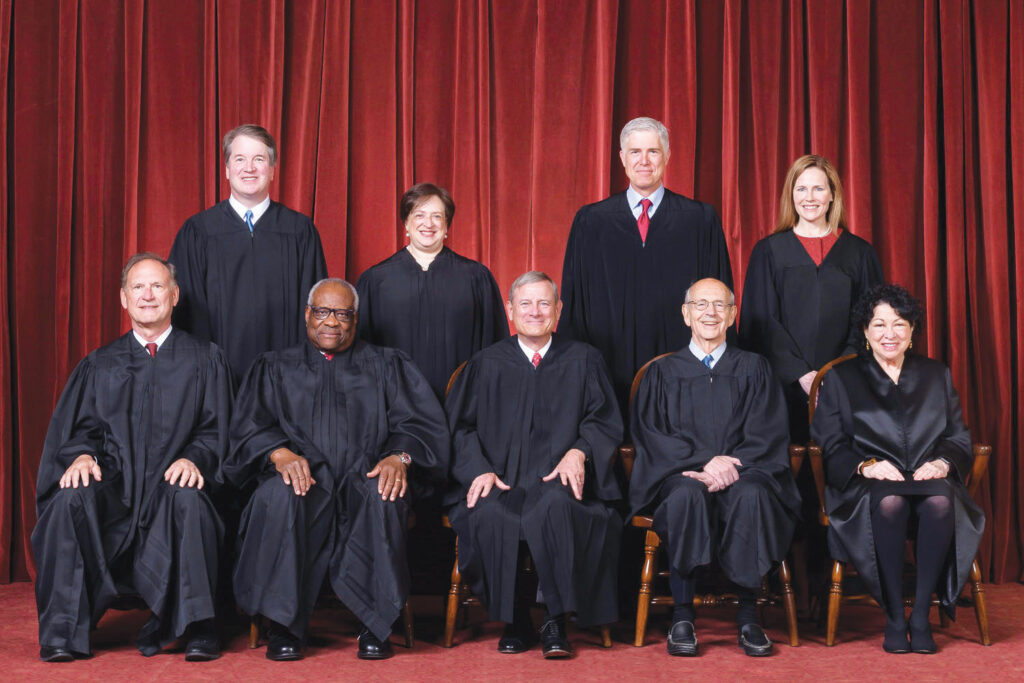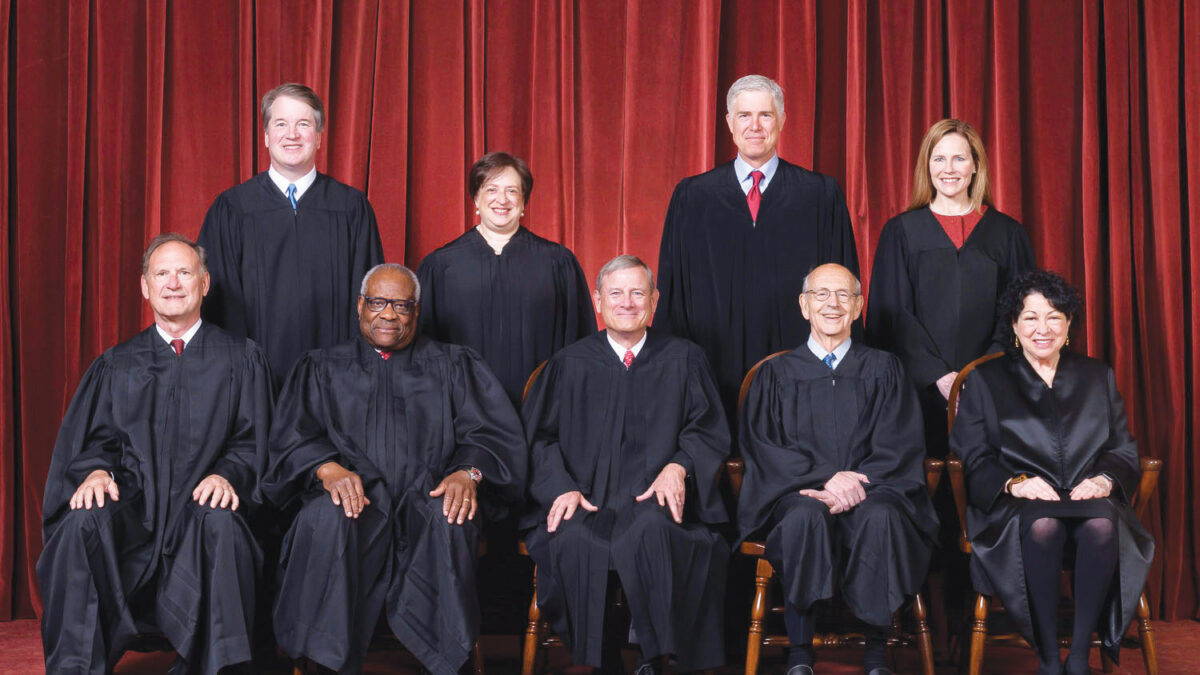
One of the most enduring legacies of the presidency of Donald Trump will most certainly be the ideological transformation of the United States Supreme Court. Two of his three selections, Neil Gorsuch and Amy Coney Barrett, will join Clarence Thomas as self-avowed originalists. Trump also nominated Brett Kavanaugh who joins Justice Samuel Alito and Chief Justice John Roberts establishing a 6-3 super-majority of conservative justices whose view of the United States Constitution has the potential to dramatically reshape the nation’s commitment to equality and fairness.
There are those who believe that the Constitution was crafted through broad collaboration as a framework for governing the United States of America, that the original document and subsequent amendments laid out the principles of good governance; a federal system in which the new national government operated in regard to the rights of the individual states, whose powers were separated in order to forestall abuse, whose Bill of Rights protected the liberty and sovereignty of We the People and, most importantly for this commentary, clearly recognized that the world in which the documents were ratified was admittedly limited in its capacity to understand or predict how the future might unfold.
On the other hand, there are others—Supreme Court justices Clarence Thomas, Neil Gorsuch, and Amy Coney Barrett to name a few—who believe that the US Constitution as it exists today was written by those who had clear and specific intentions when they wrote it, and that interpreting their words today requires that we give primacy to what was on their minds at the time. These new few have adopted the notion of originalism and are, today, on the precipice of determining that much of the social, cultural, and racial progress of the past several generations is in contradiction to what the framers of the Constitution intended.
Promoting the sound logic of a living Constitution over the rhetorical gymnastics being put forth by originalists is Distinguished Professor of Law and Dean of the UC Berkeley School of Law Erwin Chemerinsky. His Worse Than Nothing: The Dangerous Fallacy of Originalism (2022) is a scathing indictment of the current Supreme Court majority and the serious path their presence portends.*
The most recognizable example of what is to come is the recent overturning of Roe v. Wade, 1973; not necessarily that conservatives rejected a constitutional right to abortion, but the manner in which they did it.
In Dobbs v. Jackson Women’s Health, 2022, the originalist argument held sway. Since abortion is not mentioned in the Constitution as an enumerated right, originalists claim that the federal government has no business preventing the states from banning it. They claim that the Fourteenth Amendment was written to enfranchise former slaves into the body politic, while saying nothing about women, and certainly not a peep about human reproductive rights. Originalists also claim that they see no general principle of privacy embedded in the Fourth Amendment, which previous courts have upheld time and again, that might be applied to women and their bodies.
The Dobbs decision is originalist hypocrisy on full display illustrating the rhetorically sketchy manner in which the current Court may attempt to unravel society as we know it.
Much of the civil rights progress that is in the cross-hairs of an originalist Court followed the ratification of the Fourteenth Amendment in 1868.** Section 1 reads:
No State shall make or enforce any law which shall abridge the privileges or immunities of citizens of the United States; nor shall any State deprive any person of life, liberty, or property, without due process of law; nor deny to any person within its jurisdiction the equal protection of the laws.
These words clearly establish a sweeping recognition of the principle of equality before the law for all persons. Originalists claim that the authors of the Amendment were dealing with the enfranchisement of former slaves – and they certainly were – and that extending this “equal protection of the laws” to others is moving beyond their “original intent.”
Claiming that the framers of the Fourteenth Amendment were thinking only of former slaves, however, is ludicrous. If this were the case, why is this not written in terms of “former slaves” rather than “any person”?***
“At best,” Chemerinsky writes, “originalists selectively choose from history the evidence that supports their desired conclusion and ignore the evidence that does not.” Originalism, he concludes, “is just the rhetoric conservative justices use to make it seem that they are not imposing their own values, when they are doing exactly that.”
There are strong indications that the argument used to overturn Roe v. Wade will be applied to a broad array of constitutional rights. The possible ramifications are mind-boggling.
Much of the legislative progress made throughout the history of the United States, especially since the end of the American Civil War, has been affirmed through Supreme Court interpretations of the Constitution: protecting the health, safety, and economic well-being of workers; regulating the amount of pollution pumped into the water and air; breaking up monopolies and regulating unfair business practices; limiting child labor; protecting free speech; protecting the civil rights of women and minorities; protecting the voting rights of all citizens; reining in the criminal justice system; protecting our bodies and personal behaviors from government intrusion; ending racial segregation; expanding access to quality health care and education, establishing federal agencies to oversee the immensely complicated business of government; and more.
In a rhetorical two-step worthy of the world-turned-upside-down age in which we now live, originalist justices claim that they are simply interpreting the Constitution in an objective manner free from whatever political views they may hold personally.
The “origins” of originalism tell a different story.
The emergence of originalism as a theory coincided with the sweeping move toward a more just society during the post-World War II Civil Rights Movement. Conservatives claimed that liberal justices were “legislating from the bench” by fabricating new rights that were not explicitly protected in the Constitution. They responded aggressively to advances in civil rights protections afforded to minorities, women, those caught up in the criminal justice system, the disabled. It is no coincidence that the country’s backlash to civil rights progress included the election of Richard Nixon to the White House who went on to transform the political ideologies of the Supreme Court. We’ve been here before.
This is the evolutionary soup in which today’s originalism evolved; from the mind of Ronald Reagan Supreme Court nominee Robert Bork.
In October of 1987, the US Senate rejected Bork’s confirmation to the Supreme Court on a 58-42 vote. “It was,” Chemerinsky writes, “one of the most resounding defeats for a Supreme Court nominee in American history.” Bork was eminently qualified to serve on the Court while his rejection was based upon the novel idea of originalism which he had put forth in a 1971 article. As Chemerinsky writes, “Bork argued that the Supreme Court should protect only those rights that are explicitly stated in the Constitution or were clearly intended by the drafters.”
“Robert Bork’s America,” Senate Judiciary Committee member Edward Kennedy said at the time, “is a land in which women would be forced into back-alley abortions, blacks would sit at segregated lunch counters, rogue police could break down citizens’ doors in midnight raids, schoolchildren could not be taught about evolution, writers and artists could be censored at the whim of the Government, and the doors of the federal courts would be shut on the fingers of citizens for whom the judiciary is—and is often the only—protector of the individual rights that are at the heart of our democracy.”
As it turns out, Robert Bork’s Senate confirmation hearing is the last time we have heard straight talk from a nominee. Ever since, nominees have dodged the difficult questions; turning the nominating process into a sham. As Chemerinsky observes, “[Bork] was rejected by the Senate not because his positions were mischaracterized but precisely because he had set them out so clearly. The senators saw his originalist views as too dangerous for constitutional rights.”
But not today, as Chemerinsky laments, “Originalism, which seemed radical in 1987, was mainstream by 2020.”
Supreme Court Justice and self-proclaimed constitutional originalist Amy Coney Barrett shows just how far we’ve come… or, shall I say, how far we’ve sunk. “I interpret the Constitution as a law,” she says, “that I interpret its text as text and I understand it to have the meaning it had at the time people ratified it. So that meaning doesn’t change over time. And it’s not up to me to update it or infuse my own policy views into it.”
Apparently it means little to Justice Barrett that the Father of the US Constitution, James Madison, wrote, “No language is so copious as to supply words and phrases for every complex idea.”
Acknowledging Madison’s astute observation, Erwin Chemerinsky states the matter a bit more clearly. “Constitutional interpretation… has always relied on the wisdom and lived experience of individual judges. In construing a constitutional provision, they inevitably must consult many sources: the text, the Framers’ intent, the structure of the Constitution, tradition, precedent, and modern social needs.”
Chemerinsky demonstrates how dramatically things have changed in such a short period of time by citing the language of a recent Supreme Court decision that “could not have rejected originalism more clearly.”
“[C]onstitutional provisions… set forth broad principles rather than specific requirements. History and tradition guide and discipline this inquiry but do not set its outer boundaries. That method respects our history and learns from it, without allowing the past alone to rule the present. The nature of injustice is that we may not always see it in our own times. The generations that wrote and ratified the Bill of Rights and the Fourteenth Amendment did not presume to know the extent of freedom in all of its dimensions, and so they entrusted to future generations a charter protecting the right of all persons to enjoy liberty as we learn its meaning.” —Obergfell v. Hodges, 2015 (currently protects the right to same-sex marriage)
Unfortunately for liberty, these principled words are now on the constitutional chopping block of a Supreme Court bent upon mainstreaming originalist rhetoric.
*As Erwin Chemerinsky writes, “One of the most powerful defenses of originalism was [former] Justice [Antonin] Scalia’s frequent claim that he had a theory of constitutional interpretation whereas his critics had nothing to offer but the preferences of whoever was on the Court at the time of a decision…” Chemerinsky would say, as he does with his title, originalism is much Worse Than Nothing.
**I recently wrote about the enduring significance of the manner in which the Fourteenth Amendment invigorated the US Constitution with the ideals of the Declaration of Independence.
***The only mention of the formerly enslaved in the Fourteenth Amendment is in Section 3 wherein those who rebelled against the United States of America would not be compensated for the loss of their “property.”






